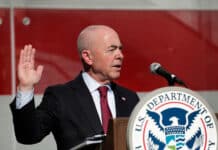
Minnesota’s Rep. Tom Emmer has introduced a bill in the House that seeks to curtail federal spending and avert future government shutdowns.
Emmer’s Government Shutdown Prevention Act is a companion bill to legislation first introduced in the Senate by Sen. Rand Paul of Kentucky. The aim is to avoid a government shutdown when congressional Democrats and Republicans cannot agree on the terms of a stopgap spending bill.
“Despite the daunting fiscal forecast, the current congressional budget process is beyond broken,” Emmer said in a Tuesday press release. “Far too frequently, Congress fails to complete the process of funding the government as the fiscal deadline looms, often forcing members of Congress into accepting one of two options: either throw up their hands and allow status quo spending levels to remain in place — without any reforms — or they allow the government to shut down.”
Emmer disagrees with the popular characterization of government shutdowns as a “tough-but-effective” strategy to reduce federal spending and come to bipartisan agreement on “important reforms.”
“After days or weeks of punishing the American people, government shutdowns inevitably end with a backroom deal negotiated by exhausted parties that does nothing to curtail runaway spending or address our nation’s long-term challenges,” he said. “The American people deserve a much better budget process.”
According to the bill, federal spending will automatically be reduced by one percent when Congress fails to agree on a stopgap bill. In the event of a persisting failure to reach an agreement, there will be another one percent reduction in federal spending for every 90 days that pass without a new spending bill.
Emmer claims his proposed legislation is necessary to prevent higher tax and inflation rates from burdening future generations.
“Our nation is nearly $30 trillion in debt. Unless we act quickly, this liability will continue to grow and will place an enormous burden on our children and grandchildren, who face a future of higher taxes and more inflation as a result,” he said.
Emmer’s bill comes at a time when the federal government faces imminent shutdown. Although the House passed a stopgap spending bill, the bill is unlikely to survive the Senate, where it needs at least 60 votes to pass. Only a few Senate Republicans intend to vote in favor of the bill, according to Politico, with the rest in opposition because it waived the cap on the federal debt.
The gulf between Democrats and Republicans on the spending bill is made evident by the statements of two House members from Minnesota. On Tuesday, Rep. Betty McCollum touted the bill for its funding of important programs and criticized Republicans for opposing it in a party-line vote.
“Because this bill included an increase in the debt ceiling to finance expenditures already incurred by the federal government, Republicans knowingly voted to default on the U.S. government’s fiscal obligations — which would undoubtedly have catastrophic consequences for our economy and millions of American families,” she said.
Rep. Jim Hagedorn, on the other hand, attacked Democrats for raising the debt ceiling by “trillions of dollars” and funding “socialist policies.”
“[Tuesday’s] Democrat stunt is designed to greenlight a debt limit increase and ram through their massive $3.5 trillion reconciliation boondoggle and radically transform America into a socialist, one-party state,” he said. “To be clear, this multi-trillion-dollar-tax-and-spend spree calls for the highest sustained federal spending levels in American history that will continue to fuel inflation, kill high-wage jobs, and foster more government dependency.”
















